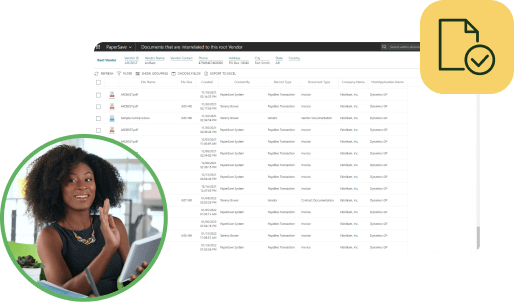
Wadih Pazos
Wadih founded both PairSoft and PaperSave. He is an avid technologist who specializes in streamlining operations and maximizing productivity.
View all posts by Wadih PazosWadih Pazos

“Once again we find that an overwhelming number of data breaches are caused by employees’ poor handling of paper and devices. If we put as much effort into our internal compliance program as we do in technical security we would be more effective at preventing data breaches,” said Roy Snell, CEO of the Society of Corporate Compliance and Ethics (SCCE) and the Health Care Compliance Association (HCCA).
A recent SCCE and HCCA study revealed that lost files and memory sticks accounted for 65 percent of all data breaches in 2012. But preventing these incidents is only one of many potential benefits of paperless document management.
In a recent blog post for Enterprise Irregulars, Sam Kemsley, independent analyst and systems architect, suggested that even small-scale paperless strategies can pay enormous dividends. Kemsley said she has worked with businesses of all sizes and nonprofits, and has contributed to both minor and full-scale document scanning projects.
As she noted in her post, even small businesses – in her case, a one-person company – can benefit from paperless document management, particularly when it comes to electronically controlling invoicing, payroll, income and tax processes.
Google, along with several other companies, recently announced a paperless initiative for 2013, which advises companies everywhere to use paperless strategies to save the environment. While that is certainly a valuable and noble goal, decision-makers wouldn’t adopt these strategies if they didn’t provide significant internal benefits.
As Kemsley noted, there are many simple strategies that businesses of all sizes can employ. She highlighted some of the ones she uses, including:
Preventing data breaches and improving backup services are far from the only benefits of moving financial documents online. In a recent blog post for Transport Topics, Bob Helms, CEO of Pegasus TransTech, wrote that paperless document management reduces traditional paper costs, increases worker productivity and – because many files are easier to find – it can enhance customer service as well.
Automated workflows empower your team to focus on larger, more complex initiatives without having to think about small processes.


Many organizations start with manual receipt handling, fragmented card feeds and slow AP processes. Implement AI agents to auto-capture receipts, route approvals, enable punch-out buys and post to the ERP.
Result: faster batching, fewer errors and cost savings. “This saves us hours every month.”
Many organizations face slow, paper-heavy AP and fragmented procurement that waste time and inflate costs. AI Agents can automate approvals, PO matching and record sync to improve speed, accuracy and control. Client quote: “It freed up hours and made our process reliable.”
Operational drag and rising costs slow growth: teams waste time on manual tasks, misaligned priorities and opaque processes. AI Agents help automate routine work and coordinate actions across teams. “We’ve lost time to repeats and handoffs,” says a typical client.
Companies struggle with manual procurement, fragmented approvals, and costly integrations that slow growth and obscure spend. Our AI Agents streamline requisitions, POs, and invoice matching to cut manual work and improve visibility. “We were wasting time and missing insights,” says a client.

Many teams start with fragmented PO/AP systems, manual matching and delayed financial reporting. Deploying AI agents to automate PO checks, real-time encumbrance tracking and invoice matching reduces processing time and errors, delivering live budgets and faster closes. “Finally, we can see current balances and approve instantly.”
Many companies juggle growing invoice volumes and legacy systems. They struggle with manual processes, compliance gaps and limited headcount. Our AI Agents automate integrations, enforce rules and surface exceptions. The typical outcome: faster closes and measurable ROI. “We stopped chasing invoices.”